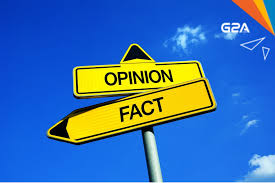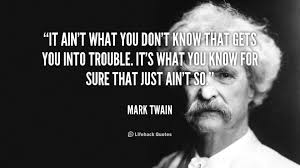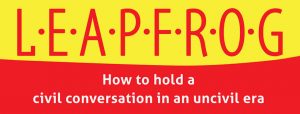That age old dichotomy:

Fact vs. Opinion, Magic vs. Reality, Faith vs. Evidence, Religion vs. Science
We’ve had these dichotomies forever it seems. Everyone knew where they stood and if there was any conflict over any of it, it was all fairly good natured (well except for those various eras when they were killing each other).
I remember believing it was good we had both sides represented, the old “it takes all kinds to make the world go ’round” philosophy. Of course, I’m remembering the post-McCarthy 1950s, not the Middle Ages.
Things feel different these days.
Last year I had occasion to drive an acquaintance of many years to a medical appointment. She’d had a CT scan and biopsy previously and wanted company as she got the results. I was glad to do it and looked forward to getting to know her better.
On the drive, our conversation took many turns, but settled eventually on her diagnosis. I heard her say, “I’ll do the chemo, but I’m not doing the radiation.”
Then she proceeded to tell me what her naturopath had recommended, the myriad supplements she would be taking, and the glucose-free diet she had already put herself on (“Cancer feeds on glucose,” she told me).
What’s a naturopath, I wondered, silently.
I felt like I was listening to someone from another world.
I’ve felt like that often since moving to Vermont.
We have a few women in our hospice choir who can’t sing in the hospital with us in the winter because they refuse to get the required flu shot. They believe the flu shot is dangerous and they side with the “anti-vaccinators.”
The voice of a local woman I heard on the Vermont Public Radio station recently, talking about her decision to not have her child vaccinated against measles, stays with me. “I don’t care what people tell me,” she said. “I’m not going to change my mind.”
From cancer treatment to vaccinations (with GMO labeling and fluoride in my toothpaste in between), I keep hearing the voices of Americans resistant to hearing what science has to say.
Or is it me? Have I been living in a bubble, cocooned away from the burgeoning world of competing theories?

Pema Chödrön writes, “The truth you believe and cling to makes you unavailable to hear anything new.”
I’m well aware of Buddhist teachings that tell me I must empty my cup before I can add to it — I must be willing to let go of what I thought I knew, to make room for the new.
Carl Sagan wrote a masterful piece on the importance of skepticism. The Fine Art of Baloney Detection was a chapter of his wonderful book, The Demon-Haunted World. I heartily recommend it, no matter where you fall on the continuum.
Why do I believe skepticism is good when it’s Carl Sagan speaking, but not when it’s a mother refusing to vaccinate her child? Why do I trust one and not the other?
More importantly, when is our initial, gut reaction sufficient to guide us and when do we pause and consider further proof? What is proof? What is sufficient proof? Sagan invokes the idea of falsification and bids us ask, “has anyone tried to disprove the claim?”
The question boils down to the one that has haunted mankind for eons (while providing a good living for certain academics), namely: How do we know what we know?

Every two years since 1988, the National Science Foundation has tested Americans’ science knowledge using the same 10 questions. The good news is that our average score hasn’t changed all that much since 1992; the bad news is the average score is a failing one.
One of the questions asks, does the earth go around the sun or does the sun go around the earth? A follow-up question was asked of the respondents who answered that one correctly, (the earth does indeed revolve around the sun) : how long does it take? Only 51% answered that correctly!
If you’d like to take THE ACTUAL QUIZ, just click here.
So there’s basic science. That’s one way of knowing; and if it doesn’t prove something, at least science can disprove something pretty well.
I feel as though we’re living in a world in which people want answers more than ever. And I’m suggesting we have three sources we turn to, as needed:
- our intuition,
- our tribe, religion, or philosophy, and
- our experts, whomever they might be
How do we choose? Maybe our friends too, but then we still rely on our intuition to tell us if we believe them. So, let’s leave it at these three. But often, the answer just isn’t there. So, here’s my real question:
What is it about “not knowing” that feels so very distressing?
How about you?
[box] LEAPFROG, my tiny handbook for handling those tricky conversations we all face, is now available in digital and paperback format.

I’m participating in Amazon Affiliates, so your purchase through my website will enable me to make a wee bit more and not increase your cost at all. The above link takes you to the LEAPFROG page on my website (not yet accessible directly) where you can learn more about the book. To skip that page and go directly to the book’s page on Amazon, click here. Thank you.
[/box]
Ally Bean
Experts. Intuition. Tribe.
Those are how I come to know what I know. I find that people who don’t want to believe in science are often people who want to have problems instead of having solutions. Thus they cling to their tribes regardless of the facts. It’s the way they’re wired, I guess– solutions are a threat.
Ally Bean recently posted…In The Countryside: A Leisurely Walk Along A Trail, A Quiet Study In Contrasts
Janet Givens
“…they cling to their tribes regardless of the facts” — you’ve worded it well, Ally; of course, we all have our tribes. Some of us are more attached to them than others. I just learned last night that I sing with a 7th grade science teacher. I’m looking forward to learning more from her on how they teach science these days.
Janet Givens recently posted…How Do We Know What We Know?
Laurie Buchanan
Janet — You’ve delivered yet another thought-provoking post. I’ll be noodling your question(s) throughout the day. Thank you for making me think!
Janet Givens
My pleasure, Laurie. And I’m eager to hear what you come up with, always.
Janet Givens recently posted…How Do We Know What We Know?
Bette Stevens
Great post, Janet! Sharing…
Janet Givens
Thank you, Bette. Twice.
Janet Givens recently posted…How Do We Know What We Know?
Pamela Wight
What a great thought-provoking post. I took the quiz, worried about how I’d do (my daughter is a 6th grade science teacher). I got an A, but worrisome that these pretty simple scientific questions are known by only 50% (or less) of the population. EDUCATION is the key. The more we’re educated, the more we know how much we don’t know. I think it’s healthy to know we don’t have all the answers. But I’m with Ally: science-intuition-tribe. Because if we listen to our elders, who have “been there,” they may know more than anyone gives them credit for.
Pamela Wight recently posted…From His Point of View
Janet Givens
You know, Pam, I never thought to put those three in rank order. So thanks to you both for doing that. Congratulations on your A. I hope someone gives you a gold star.
Janet Givens recently posted…How Do We Know What We Know?
Arlene
Some people hold on to what they “know” out of fear. If they believe that something is certain, that gives them something to hold on to. And if what they believe in is disproven, they’re left flailing. No one likes that feeling. I think we’re all guilty of it to a certain extent. We have to have something solid to hold on to in this fluctuating world. But I really do wish people would get vaccinated. Some stubbornly held beliefs are more dangerous than others.
Arlene recently posted…Words of wisdom: Parent-isms
Janet Givens
Fear is powerful, especially when we don’t recognize it. Thanks for joining in Arlene. And indeed, these various differences can be merely entertaining, some can be frustrating, and some, as you pointed out, are downright life threatening. Glad you stopped by.
Janet Givens recently posted…How Do We Know What We Know?